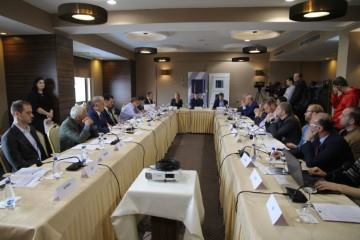Pristina, 22 October 2018 – Kosovo Law Institute (KLI), on Monday, in Pristina, held a roundtable “How to prevent and fight criminalization of politics in Kosovo: Solution by legal regulation or code of conduct?” as project activity “Increase of civic participation in electoral processes in Kosovo” within the Election Integrity Coalition (EIC).”
At this roundtable, KLI’s report on the implementation of Standard Operating Procedures was published in the framework of the organization of elections in Kosovo entitled “Decriminalization of politics in Kosovo”.
Part of the panel were representatives of Democratic League of Kosovo (LDK), Mr. Armend Zemaj, representative of Social Democratic Party (PSD), Mr. Dardan Sejdiu, representative of Social Democratic Initiation (NISMA), Mr. Bilall Sherifi, representative of Alliance for the Future of Kosovo, Mr. Muharrem Nitaj, representative of Alternative, Mr. Hasan Preteni, representative of New Kosovo Alliance, Mr. Vesel Makolli and executive director of the Kosovo Law Institute, Mr. Ehat Miftaraj.
At the roundtable it was said that the rule of law continues to be the weakest link in the chain of state-building and governance in Kosovo. The relevant institutions, and especially the prosecution and the judiciary, face systematic and repeatable problems, one of which continues to be political interference.
And despite all the problems of the justice system, taking into account only the few cases that this system addresses, it is easy to create the impression that crime and politics coexist in Kosovo. Cases when senior state officials start the day of work in court as defendants before they continue to govern the country are not rare. Currently, there are seven ministers who have indictments for which court proceedings are being conducted in the courts, mainly for corruption criminal offenses.
According to the KLI’s report, the current situation of political caste in Kosovo, which in one way or another coexists with crime, is illustrated through several cases, such as the case of Minister of Economic Development, Valdrin Lluka, case to the former mayor of Gjakova Municipality, currently Minister of Infrastructure, Pal Lekaj, the case of the political affairs known by the public as “Pronto”, and some other cases that the KLI has identified during the process of monitoring the court hearings in criminal cases in all Kosovo courts.
Characteristic of these cases, according to the KLI, is the fact that a large number of these senior public officials spend a part of their day in the courtrooms as suspected of various criminal offenses where corruption offenses dominate, while the rest of the time exercise their public competences and responsibilities.
In this regard, KLI has estimated that criminalization of the political scene in Kosovo has become a concern in Kosovo, especially since the declaration of Kosovo’s independence, becoming a ‘standard’ of governance. The highest institutions of the state, such as the Assembly and Government, but also the local government in the municipalities, are rarely leaded by persons with criminal record or having problems with the law.
Government members and governance by persons with criminal record or having problems with the law undoubtedly reduce credibility and legitimacy in relation to citizens and seriously affect the values and principles promoted by the Constitution of Kosovo.
Participants assessed that the vetting process is the first step for fighting criminalization of the political scene, and then pushing ahead of the current laws in the Kosovo Assembly. As a third step, was assessed the mechanism for measuring the performance of the judicial and prosecutorial system was assessed. However, according to the participants, all these steps for decriminalization can be achieved if there is political will, issues that have been continuously raised by the KLI.
At this stage, based on the legal framework in Kosovo, the practice developed by the Supreme Court regarding the deprivation of the right to be elected, the practices and experiences of different states, and with particular emphasis on the situation created on the political scene and the state and public administration, the KLI has proposed several models of how the Republic of Kosovo can approach, cleaning or decriminalizing the political scene in Kosovo, and that limitation by legislation and institutional exclusion.
The KLI considers that the legislative prohibition of limiting the right to be elected can only be regulated through constitutional amendments and taking into account the good criteria and practices regarding election issues and good governance.
Further, according to the KLI, the institutional exclusion either through the limitation of running or removal in the positions where they are appointed of persons in the selected institutions can be done through internal rules on inadequacy. Political parties through internal rules adopting Code of Conducts would limit the right of citizens with criminal records or who are inadequate to join political parties. The Code of Conducts could build practices through which political parties can not propose leadership positions, in political posts or as party candidates inappropriate persons and who have contested integrity.
Civil society representatives who contributed with discussion at this roundtable emphasized that NGOs have continuously raised the issue of influencing political party interventions that are or have been in power, in the judicial system, and the hesitation of political parties to cooperate in resolving decriminalization. According to them, the issue of the vetting process should be taken more seriously in order to strengthen the country, as they said; justice is the backbone of the state.
For more download the report in albanian, english and serbian.
##
This grant is funded by the Democratic Society Project (DSP) project – funded by the Swiss Agency for Development and Cooperation (SDC) and Ministry of Foreign Affairs of Denmark (DANIDA) and managed by the Kosovo Civil Society Foundation (KCSF).

